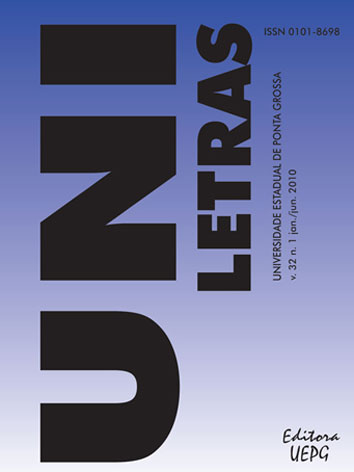Fahrenheit 451: o vazio da memória num mundo sem livros. Doi: 10.5212/Uniletras.v.32i1.137153
DOI:
https://doi.org/10.5212/uniletras.v32i1.2535Palavras-chave:
Cinema, Literatura, Memória, Movimento Nouvelle Vague,Resumo
No ano de 1966, o diretor francês François Truffaut, um dos precursores da Nouvelle Vague (“nova onda”), lançou uma obra-prima de ficção científica Fahrenheit 451, versão cinematográfi ca do romance homônimo do escritor norte-americano Ray Bradbury. Nouvelle Vague foi um movimento que rompeu com a estética hollywoodiana e inseriu a imagem num contexto refl exivo. O filme Fahrenheit 451 tem como protagonista Montag, um bombeiro cuja função é recolher e queimar livros, numa sociedade totalitária em que os livros são proibidos. Este artigo busca realizar um estudo sobre a obra fílmica Fahrenheit 451, partindo da análise de cenas da narração fílmica, tendo como referência os conceitos do movimento Nouvelle Vague em diálogo com a memória e o esquecimento.
Palavras-chave: Cinema. Literatura. Memória. Movimento Nouvelle Vague.
Downloads
Downloads
Edição
Seção
Licença
Autores que publicam nesta revista concordam com os seguintes termos:
a) Os autores mantém os direitos autorais e concedem à revista o direito de primeira publicação, com o trabalho simultaneamente licenciado sob a Creative Commons Attribution License que permite o compartilhamento do trabalho com reconhecimento da sua autoria e publicação inicial nesta revista.
b) Esta revista oferece acesso livre imediato ao seu conteúdo, seguindo o princípio de que disponibilizar gratuitamente o conhecimento científico ao público proporciona maior democratização mundial do conhecimento. Para maiores informações sobre esta abordagem, visite Public Knowledge Project, projeto que desenvolveu este sistema para melhorar a qualidade acadêmica e pública da pesquisa, distribuindo o OJS assim como outros softwares de apoio ao sistema de publicação de acesso público a fontes acadêmicas. Os nomes e endereços de e-mail neste site serão usados exclusivamente para os propósitos da revista, não estando disponíveis para outros fins.

This work is licensed under a Creative Commons Attribution 4.0 International License.





